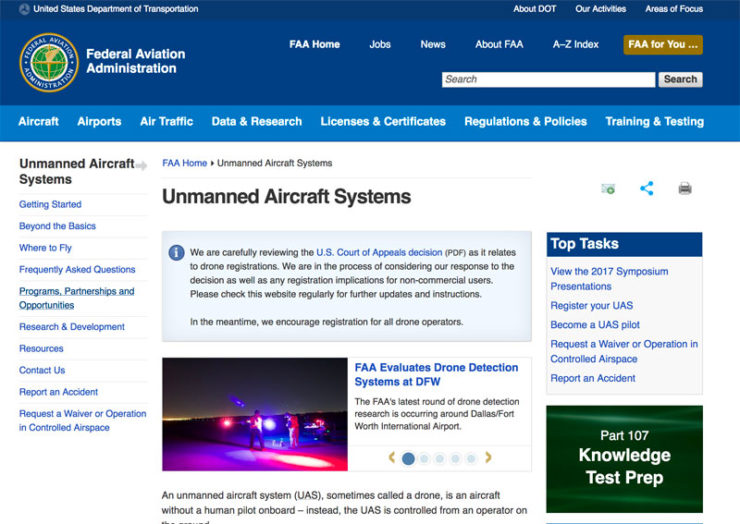Drone Regulations, Laws and Rules and For Flying
Flying a drone can be extremely exciting! But before you purchase a drone and take flight, you’ll want to make sure that you are aware of the rules and regulations put into place by the Federal Aviation Administration (FAA) regarding drone operation in U.S. airspace.
Basic Drone Rules and Regulations
The FAA has defined acceptable drone use for professional and personal use. As a drone operator, you have rights and responsibilities that surround the use of your drone. Here are the main rules regarding acceptable Unmanned Aircraft System (UAS) operation:
- Drones should be flown below 400 feet, and remain clear of any obstacles
- Drones must remain within visual line of site at all times while in flight
- Any drone weighing less than .055 lbs. up to 55 lbs. must be registered with the FAA before taking flight
- Unmanned aircraft weighing more than 55 lbs. cannot be operated under UAS rules
- Drones may not exceed a speed of 100 mph
- Drones may not be flown within 5 miles of any airport, unless notice has been given to the airport traffic control tower
- Drones may only be operated during daylight hours, limiting allowable flight hours to local time between official sunrise and sunset times
- Unmanned aircraft may not interfere with the operation of manned aircraft, and must always yield the right of way
- Unmanned aircraft cannot be flown over people or operated from a moving vehicle
- If your drone is used for commercial purposes, it must be flown by a pilot with remote pilot certification and undergo preflight inspections before every flight
- Any commercial flight of a drone that falls outside of the rules and regulations under UAS requires an exemption under Section 333, which will require you to apply with a detailed flight plan/operation, and include a safety plan
Interesting Drone Fact
Did you know that the use of drones is prohibited in all U.S. National Parks? Should you be found violating this ban you will be subject to fines and prosecution. Additionally, some municipalities have passed legislation limiting the use of drones. These places include: Charlottesville, VA, Iowa City, IA, and St. Bonifacius, MN. The legislation sets a requirement of a warrant, or permit, before use of a drone is allowed. The only allowable use without a warrant in these locations is for emergency purposes, such as a search and rescue mission.
Registering Your Drone

Drone registration is a necessary evil regulated by the FAA. With the growth of the drone industry, it is important to regulate the use of drones so that the operation of unmanned aircraft does not negatively impact and interfere with large aircraft operations or invade the privacy of the public. Registration is one way for the FAA to ensure that drone operators follow safety guidelines, and are held accountable. If your drone falls within the weight guidelines, you will need to register it before flying. Many toy drones do not weigh more than 0.55 lbs. However, it is important to note that if you plan to attach a camera, this will count toward total weight and you will then need to register your drone.
Registering is easy. Any U.S. resident or legal permanent resident can register their drone online via the FAA portal. The cost of your registration is $5, and your registration is valid for 3 years. If the registrant is under 13, a parent or guardian must complete the registration on behalf of the minor.
The FAA requires that your registration number be written on each drone that you own, so one registration covers each drone in your fleet. You must carry the certificate issued by the FAA on your person during all flights.
Should you fly your drone without completing the registration process. You can be subject to a fine of $27,500 and up to 3 years in jail.
Other Drone Rules to Follow
Commercial operation of drones under class B, C, D, and E airspace requires a vetted drone pilot. The FAA also prohibits the crossing of state lines during flight. As stated earlier, should your flight plan fall outside these parameters, you can apply for a Section 333 waiver. If approved, your flight will be allowable.
Section 333 exceptions are usually granted for film, photography, real estate purposes, health and safety operations, search and rescue, law enforcement, and much more. If you can prove that your flight plan can be executed safely, it is unlikely your exception waiver application will be denied.
Knowing and following FAA guidelines surrounding the proper and legal use of your drone will keep you safe from legal trouble so that you can enjoy your drone safely.
|